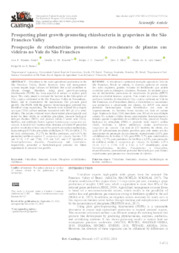Prospecting plant growth-promoting rhizobacteria in grapevines in the São Francisco Valley.
Prospecting plant growth-promoting rhizobacteria in grapevines in the São Francisco Valley.
Author(s): MENDES JÚNIOR, J. P.; FRACETTO, G. G. M.; FRACETTO, F. J. C.; SILVA, D. J.; LIRA JÚNIOR, M. de A.; BARROS, F. M. do R.
Summary: Viticulture is the main agricultural production in the São Francisco Valley, Brazil; however, farm soil management systems require large volumes of fertilizer that could contribute to climate change. Therefore, using plant growth-promoting rhizobacteria (PGPR) has been reported to reduce or replace plant input. This study aimed to evaluate the bacteria in the rhizosphere of Vitis vinifera cultivated in the São Francisco Valley in Pernambuco, Brazil, and to characterize the mechanisms that promote plant growth. The PGPR with the greatest biotechnological potential was identified using sequencing. The bacteria were isolated from tryptic soy agar (TSA) culture medium inoculated with 100 ?L of a serial dilution. The isolates obtained were characterized phenotypically and tested for their ability to solubilize phosphate, promote biological nitrogen fixation (BNF), and produce indole-3 acetic acid (IAA), biofilms, and antibiotic factors against Xanthomonas campestris pv. viticola. A total of 423 bacteria were obtained, of which 99 presnted positive results for at least one of the growth-promotion mechanisms, representing 6.85% for phosphate solubilizers, 0.74% for BNF, 5.7% for IAA synthesizers, 11.27% for biofilm producers, and 4.01% for promoting antibiosis against X. campestris pv. viticola. Isolates 3.19 and 31.14; 3.17 and 17.04; 5.35 and 5.42; and 5.37 identified as Stenotrophomonas, Bacillus, Pseudomonas, and Clostridium, respectively, presented a biotechnological potential for future experiments to promote vine growth.
Publication year: 2024
Types of publication: Journal article
Unit: Embrapa Semi-arid Region
Observation
Some of Embrapa's publications are published as ePub files. To read them, use or download one of the following free software options to your computer or mobile device. Android: Google Play Books; IOS: iBooks; Windows and Linux: Calibre.
Access other publications
Access the Agricultural Research Database (BDPA) to consult Embrapa's full library collection and records.
Visit Embrapa Bookstore to purchase books and other publications sold by Embrapa.

